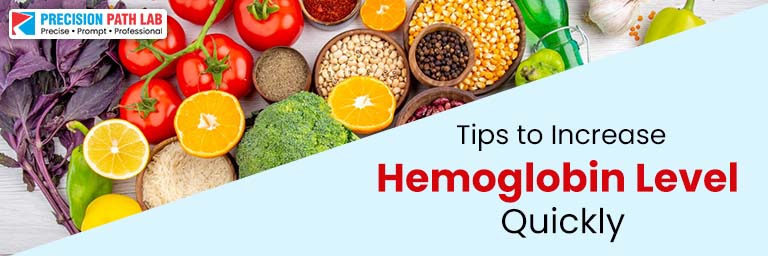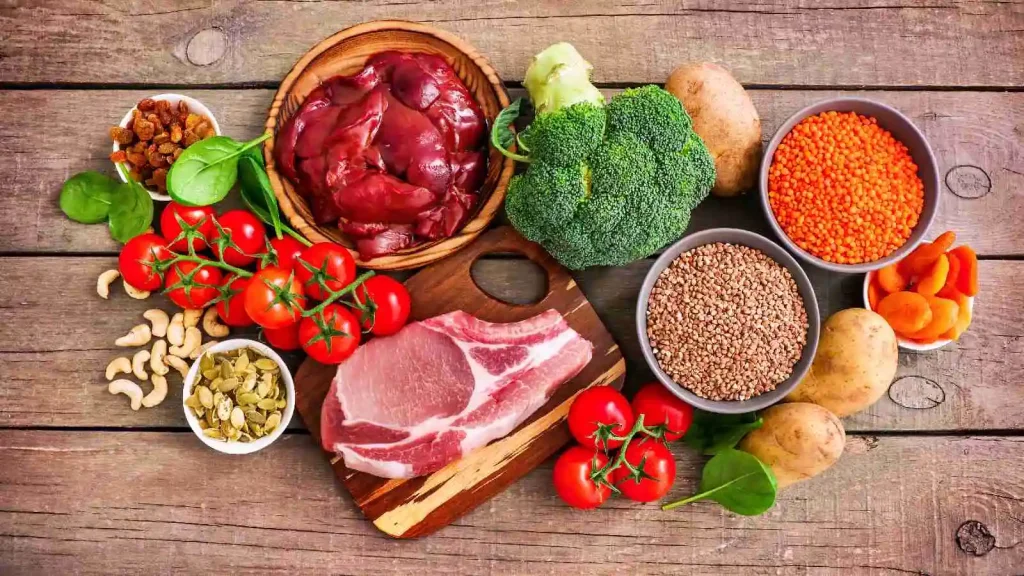
Increase Hemoglobin Levels Quickly: Effective Tips and Dietary Essentials
Are you landed here while looking for how to increase hemoglobin levels? firstly we must know about hemoglobin, Do you know hemoglobin plays the role of a superhero in your body? It’s a protein in your red blood cells (RBCs) that carries oxygen from your lungs to all the cells in your body. You can also compare hemoglobin with a delivery person. The way a delivery person picks up your order from the outlet and delivers it to you at your place. Similarly, hemoglobin picks up oxygen from your lungs and delivers it to every part of your body so that your cells can use it to do their jobs properly.
Moreover, without enough hemoglobin, your cells won’t get the oxygen they need, which can make you feel tired, weak, and can cause other health problems. This is why hemoglobin is super important for keeping your body running smoothly and healthy! So, are you eager to know how to increase hemoglobin levels? Then, you are at the correct website. In this blog, we will focus on all the important sections related to hemoglobin. Thus, let’s get started and first understand how hemoglobin works in our body.
How Does Hemoglobin in Our Body Work?
The step-by-step process for the working of a hemoglobin in our body is given below:
Oxygen Intake
Firstly, when we breathe in, oxygen enters the lungs and attaches to the iron atoms in the hemoglobin molecules within red blood cells.
Transportation
Then, hemoglobin acts as a carrier and transports oxygen-rich blood from the lungs to tissues, organs, and throughout the body via the circulatory system.
Oxygen Release
As red blood cells travel through the body’s blood vessels, they reach tissues and organs where oxygen is needed. Then, hemoglobin releases the oxygen molecules, allowing cells to use them for energy production through cellular respiration.
Returning
As cells use oxygen, they produce carbon dioxide as a waste product. In this process, hemoglobin also helps in picking up carbon dioxide and transporting it back to the lungs.
Exhaling Carbon Dioxide
When you breathe out, you release carbon dioxide from your lungs, and the cycle starts again when you breathe in fresh oxygen.
This is the continuous cycle, ensuring that oxygen is efficiently delivered to cells throughout the body while removing carbon dioxide from our body. This is why Hemoglobin’s role is crucial in binding and releasing oxygen for maintaining the body’s overall function and survival. But most people don’t know the reasons for low hemoglobin counts in their blood. The next section will give you the answers.
What Are the Reasons for a Low Hemoglobin Count?
There are uncountable reasons why the hemoglobin levels can dip in your body, which are as follows:
- Inadequate intake of iron in your diet
- Suffering from chronic diseases like kidney problems or cancer
- Taking certain medications for so long, such as antibiotics, chemotherapy drugs, and antiretroviral drugs, can cause anaemia as a side effect.
- At the time of pregnancy, the body needs more blood, which lowers the hemoglobin count.
- Some genetic conditions, such as thalassemia and sickle cell anaemia, can also affect hemoglobin production or the structure of hemoglobin molecules.
- Loss of blood at the time of menstruation or due to an injury
There are many more reasons why someone might have a low hemoglobin count. This is why it’s essential to determine the root cause of low hemoglobin through medical evaluation and testing to ensure appropriate treatment and management. Apart from that, having hemoglobin boosting foods can also help.
How Much Hemoglobin Is Needed by an Adult Human?
The amounts of hemoglobin needed by an adult human are:
| Age Group | Hemoglobin Levels (g/dL) |
| Adult Men | 14-18 |
| Adult Women Pregnant Women | 12-16 Below 11 |
| Older Ages | Can slightly decrease |
These values might vary slightly from one laboratory to another due to the conduct of the tests and the specific reference ranges they use. This is why, it’s necessary to consult a healthcare professional for a correct diagnosis. Furthermore, selecting the best diagnostic center in Jaipur equally plays an essential role. Now, let’s move on to the next section and learn about some symptoms of low hemoglobin.
Symptoms of Low Hemoglobin
Due to low hemoglobin levels, someone might experience these symptoms often:
- Fatigue
- Weakness
- Shortness of breath
- Dizziness
- Pale Skin
- Headache
- Cold hands and Feet
- Irregular Heartbeat
- Chest Pain
- Brittle Nails
- Cravings
- Poor Concentration
- Hair Loss
If you are experiencing any of these symptoms, an accurate diagnosis and appropriate treatment are necessary to address the underlying cause of low hemoglobin levels. This is why you should always take a full body checkup in Jaipur for a better diagnosis.
10 Foods That Increase Hemoglobin Naturally
Here is the top 10 hemoglobin food chart that can help increase hemoglobin levels:

Spinach
Popeye knew what he was doing! Spinach is loaded with iron, which is like fuel for your hemoglobin.
Lentils
These little legumes pack a punch of iron, plus they’re delicious in soups, salads, and curries.
Lean Red Meat
Beef, lamb, and other red meats are rich in heme iron, the kind that your body absorbs best.
Pumpkin Seeds
Crunchy and nutritious, pumpkin seeds are a great source of iron, zinc, and magnesium.
Quinoa
This trendy grain is not only high in iron but also gluten-free and versatile in recipes.
Beans
Kidney beans, chickpeas, and black beans are all hemoglobin heroes, packed with iron, folate, and protein.
Tofu
Plant-based eaters rejoice! Tofu is not only a great source of protein but also of iron.
Eggs
If you’re an egg lover, you’re in luck. Eggs are brimming with iron, B vitamins, and other nutrients.
Dark Chocolate
Indulge your sweet tooth with dark chocolate, which contains iron and antioxidants. Just don’t overdo it!
Fortified Cereals
Start your day off right with a bowl of fortified cereal, packed with iron and other essential nutrients.
Adding these foods to your diet can make your food healthy and nutritious and increase hemoglobin levels. However, it’s essential to consult with a professional before taking the given food items to increase hemoglobin.
Tips to Increase Hemoglobin Levels at Home
- Eat iron-rich foods that include leafy greens, lean meats, beans, and fortified grains.
- An increased intake of foods rich in vitamin C (like oranges, strawberries, and bell peppers) can help your body absorb iron better.
- Avoid iron-blockers such as coffee, tea, and calcium-rich foods. It can hinder iron absorption.
- Cooking with cast-iron pans can boost your iron intake, especially when preparing acidic foods like tomatoes.
- Always stay hydrated, as it helps your body produce more blood and keeps everything flowing smoothly.
- Take proper hours of sleep, as your body does a lot of its repair work while you snooze.
These are some important tips for you on how to increase hemoglobin level quickly. So, try them and see the amazing results and changes in your body.
Conclusion
The best answer to how to increase hemoglobin levels quickly is to change your diet and lifestyle. It is important to eat the correct foods to improve hemoglobin. So, if you are still making mistakes in your diet and routine, change them and lead a healthy life. Thus, check your hemoglobin count now. For that, check the CBC test price in Jaipur now.
Book your slot now for a lab visit or you can also opt for home sample collection and get the best diagnostic care in Jaipur at Precision Pathlab.
Frequently Asked Questions About How to Increase Hemoglobin
Can Supplements Help Increase Hemoglobin Levels?
In some cases, doctors may recommend iron supplements to help boost hemoglobin levels, especially if dietary changes alone aren’t enough. However, it’s essential to consult with a healthcare professional before starting any new supplements.
How long does it take to increase hemoglobin levels naturally?
It varies from person to person, but with consistent effort and a balanced diet, you can start to see improvements in your hemoglobin levels within a few weeks to a couple of months.
Are there any specific foods to avoid when trying to increase hemoglobin?
There are some specific foods, like coffee, tea, and calcium-rich foods, that can inhibit iron absorption. So it’s best to consume them in moderation and not alongside iron-rich meals. Moreover, processed and junk foods generally lack the nutrients needed to support healthy hemoglobin levels, so minimizing their intake is advisable.